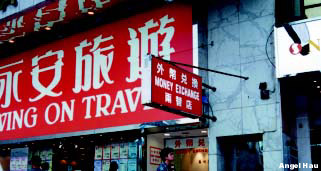By Alison Yeung
| Article in the Same Section: | Marriage Rates Decline |
Travelling safely is always a major concern of tourists. Buying insurance is no doubt a means of assurance.
According to Mr. Eddie Ng, the customer service manager for Morning Star Travel Service, there are basically two types of travel insurance.
The first type is offered by travel agencies, and the tourists do not need to pay any premium. However, tourists can make a claim only in case of very serious injuries or death.
The second type is more comprehensive. Though the tourists need to pay a premium, they can claim money from an insurance company not only in case of injuries, but also in emergencies like flight delays and loss of money and luggage.
Apart from financial compensation, tourists can also seek help in times of trouble.
"There will be an SOS hotline for tourists to seek help even when they are in foreign countries," said Mr. Ng.
According to Mr. Ng, it is common for tourists to buy travel insurance.
"About 60 percent of tourists who join package tours in our company choose to buy travel insurance. It is like a habit," said Mr. Ng.
Though buying travel insurance is common, whether tourists understand how they can be protected is yet another problem.
Mr. Bernard Chan, a member of the Legislative Council from the functional constituency of insurance, said that most tourists do not read policies very carefully until there is accident and thus disputes arise.
One example was the China Airlines plane crash. Though most burn victims had bought insurance, no compensation could be claimed because burns are not
covered by the insurance they had applied for.
"To be humanistic and standing in the shoes of the victims, the insurance policy may be too harsh.
"But a contract is a contract and insurance is a kind of business. It is hard to maintain a balance between social justice and the interest of companies," said Mr. Chan.
Mr. Chan said that the lack of understanding is a sort of cultural issue.
"Hong Kong tourists pay too much attention to the price of insurance instead of the quality, while in the West tourists clearly know what they need and are willing to make extra payments for the extension of insurance coverage and period," said Mr. Chan.
 Apart
from the cultural problem, Mr. Chan said that the staff in travel agencies
should explain the terms of policies clearly to tourists.
Apart
from the cultural problem, Mr. Chan said that the staff in travel agencies
should explain the terms of policies clearly to tourists.
"Somehow they also need to cultivate their knowledge of insurance," said Mr. Chan.
However, Mr. Chan said government supervision of travel agencies selling insurance is not possible.
"Unless there is proper examination given to the staff of travel agencies, supervision will be impossible. But such an idea is not easy to carry out," said Mr. Chan.
Charles Lam, a Year 1 student at the University of Hong Kong, had the experience of buying insurance in travel agency.
"I think the staff explained the details quite clearly. But they just emphasized in what cases that I could not claim any money instead of telling me how I was being protected," said Mr. Lam.
Mr. Lam also felt that the terms in the insurance policies are actually too vague.
"It seems that the insurance company promised tourists nothing," said Mr. Lam.
Mr. Lam suggested that insurance companies should provide more information to tourists.
"For example, information like which hospital I should go to in a foreign country should be stated clearly so that tourists will feel more secure," said Mr. Lam.
Regarding the future development of the industry, Mr. Chan was optimistic.
"Hong Kong is now in the stage of transition. But
it is following the path of the United States and European countries,"
said Mr. Chan. ![]()